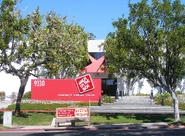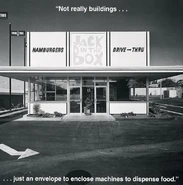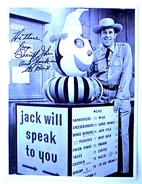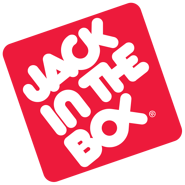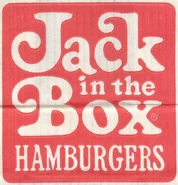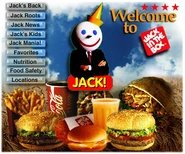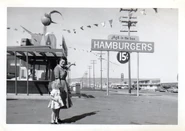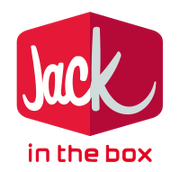
The current logo, first used on March 15, 2009.
Jack in the Box is an American fast-food restaurant chain founded February 21, 1951, by Robert O. Peterson in San Diego, California, where it is headquartered. The chain has over 2,200 locations, primarily serving the West Coast of the United States. Restaurants are also found in selected large urban areas outside the West Coast, including Phoenix, Denver, Albuquerque, El Paso, Dallas-Fort Worth, Houston, Austin, San Antonio, Oklahoma City, Baton Rouge, Nashville, Charlotte, Kansas City, St. Louis, Indianapolis, and Cincinnati as well as one in Guam.[1] The company also formerly operated the Qdoba Mexican Grill chain until Apollo Global Management bought the chain in December 2017.[2]
Food items include a variety of chicken strips[3] and French fries[4] along with hamburger and cheeseburger sandwiches[5] and selections of internationally themed foods such as tacos[4] and egg rolls.
History
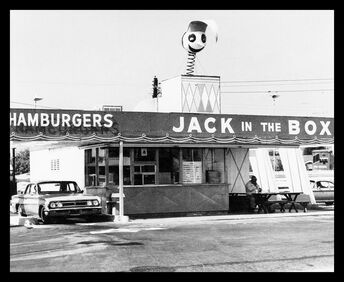
The original Jack in the Box restaurant, circa 1951.
Robert O. Peterson already owned several successful restaurants when he opened Topsy's Drive-In at 6270 El Cajon Boulevard in San Diego in 1941. Several more Topsy's were opened. By the late 1940s, Peterson's locations had developed a circus-like décor featuring drawings of a starry-eyed clown. In 1947, Peterson obtained rights for the intercom ordering concept from George Manos who owned one location named Chatterbox in Anchorage, Alaska, the first known location to use the intercom concept for drive-up windows. In 1951, Peterson converted the El Cajon Boulevard location into Jack in the Box, a hamburger stand focused on drive-through service.[6] While the drive-through concept was not new, Jack in the Box innovated a two-way intercom system, the first major chain to use an intercom and the first to focus on drive-through.[7] The intercom allowed much faster service than a traditional drive-up window; while one customer was being served at the window, a second and even a third customer's order could be taken and prepared. A giant clown projected from the roof, and a smaller clown head sat atop the intercom, where a sign said, "Pull forward, Jack will speak to you." The Jack in the Box restaurant was conceived as a "modern food machine," designed by La Jolla, California master architect Russell Forester.[8][9][10] Quick service made the new location very popular, and soon all of Oscar's locations were redesigned with intercoms and rechristened Jack in the Box restaurants.
Peterson's holding company was called Foodmaker Company, which by 1966 was known as Foodmaker, Inc. All Jack in the Box locations at this time were company-owned; location sites, food preparation, quality control and the hiring and training of on-site managers and staff in each location was subject to rigorous screening processes and strict performance standards. By 1956 there were over 180 locations, mainly in California and the Southwest.
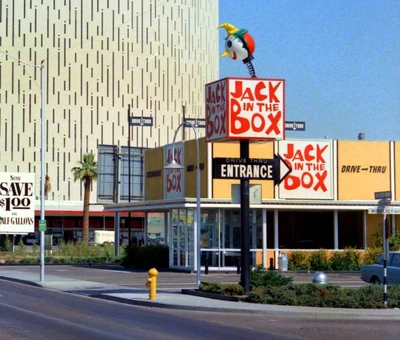
A Jack in the Box location in the 1970s.
In 1968, Peterson sold Foodmaker to Ralston Purina Company. In the 1970s, Foodmaker led the Jack in the Box chain toward its most prolific growth (television commercials in the early 1970s featured child actor Rodney Allen Rippy) and began to franchise locations. The chain began to increasingly resemble its larger competitors, particularly industry giant McDonald's. Jack in the Box began to struggle in the latter part of the decade; its expansion into East Coast markets was cut back, then halted. By the end of the decade, Jack in the Box restaurants were sold in increasing numbers.
Around 1980, Foodmaker dramatically altered Jack in the Box's marketing strategy by literally blowing up the chain's symbol, the jack in the box, in television commercials with the tagline, "The food is better at the Box".[11] Jack in the Box announced that it would no longer compete for McDonald's target customer base of families with young children. Instead, Foodmaker targeted older, more affluent "yuppie" customers with a higher-quality, more upscale menu and a series of whimsical television commercials featuring Dan Gilvezan, who attempted to compare the new menu items to that of McDonald's and other fast-food chains, to no avail; hence "There's No Comparison", their slogan at the time. Jack in the Box restaurants were remodeled and redecorated with decorator pastel colors and hanging plants; the logo, containing a clown's head in a red box with the company name in red text to or below the box (signs in front of the restaurant displayed the clown's head only), was modified, stacking the words in a red diagonal box while still retaining the clown's head; by about 1981 or 1982, the clown's head was removed from the logo, which would remain until 2009.
Television advertising from about 1985 onward featured minimalistic music performed by a small chamber-like ensemble (specifically a distinctive seven-note plucked musical signature). The menu, previously focused on hamburgers led by the flagship Jumbo Jack, became much more diverse, including salads, chicken sandwiches, finger foods, and seasoned curly fries, at a time when few fast-food operations offered more than standard hamburgers. Annual sales increased through the 1980s. Ralston Purina tried further to mature the restaurant's image, renaming it "Monterey Jack's" in late 1985. The name change proved to be a disaster, and the Jack in the Box name was restored in early 1986.
After 18 years, Ralston Purina decided in 1985 that Foodmaker was a non-core asset and sold it to management. By 1987, sales reached $655 million, the chain boasted 897 restaurants, and Foodmaker became a publicly-traded company.
At their annual meeting in July 2018, the National Jack in the Box Franchisee Association, which represents the owners of about 2,000 of the chain's 2,240 restaurants, voted "no confidence" in the company's chief executive officer, Leonard "Lenny" Comma, and called for him to resign.[12] He was succeeded by Darin Harris in 2020.[13]
Products
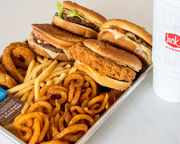
See also: List of menu items
Although best known for its hamburgers, Jack in the Box's most popular product is its taco, which it has sold since the first restaurant in the 1950s. As of 2017, the company sold 554 million a year manufactured in three factories in Texas and Kansas.[14] What makes the taco unusual is that it is created with the meat and hard taco shell in the Texas and Kansas facilities, then frozen for transport and storage. At the restaurant, it is then deep-fried, then prepared with lettuce, cheese, and mild taco sauce before serving.
Besides tacos, other Americanized foods from ethnic cuisines that Jack in the Box offers include egg rolls, breakfast burritos, and poppers. New items come in on a rotation every three to four months, including the Philly cheesesteak and the deli style pannidos (deli trio, ham & turkey, zesty turkey) which were replaced by Jack's ciabatta burger and included the original ciabatta burger and the bacon 'n' cheese ciabatta. Jack in the Box also carries seasonal items such as pumpkin pie shakes, Oreo mint shakes, and eggnog shakes during the Thanksgiving and Christmas holidays. In some locations, local delicacies are a regular part of the menu. Locations in Hawaii, for example, include the Paniolo Breakfast (Portuguese sausage, eggs, and rice platter) and teriyaki chicken and rice bowl. In the Southern United States, the company offers biscuits and sweet tea. In Imperial County, California, some locations sell date shakes, reflecting the crop's ubiquity in the region's farms. In the spring of 2007, Jack in the Box also introduced its sirloin burger[15], which was followed up with the sirloin steak melt.[16]
The Bonus Jack was first released in 1970 and has been reintroduced to Jack in the Box menus at times throughout the years, still containing "Jack's Secret Sauce".[17] In November 2009, the company discontinued its popular ciabatta sandwiches/burgers. In 2012, Jack in the Box introduced a bacon milkshake as part of its "Marry Bacon" campaign.[18]
The Sourdough Jack, which uses two slices of sourdough bread with a hamburger patty, has been around since 1997 (although it was first introduced in 1991 as the "Sourdough Grilled Burger").[19]
In October 2016, the "Brunchfast" items were introduced. Those are Bacon & Egg Chicken Sandwich, Blood Orange Fruit Cooler, Brunch Burger, Cranberry Orange Muffins, Homestyle Potatoes, and Southwest Scrambler Plate.[20]
In January 2018, the "Food Truck Series" sandwiches were introduced, including the Asian Fried Chicken, Pork Belly BLT, and Prime Rib Cheesesteak.[21]
Advertising
See: Advertising
Controversies
In 1981, horse meat labeled as beef was discovered at a Foodmaker plant that supplied hamburger and taco meat to Jack in the Box. The meat was originally from Profreeze of Australia, and during their checks on location, the food inspectors discovered other shipments destined for the United States which included kangaroo meat.
E. coli outbreak
Corporate governance
Management
| Name | Current Position | Officer Since[22][23] |
|---|---|---|
| Leonard A. Comma | President, Chairman of the Board and Chief Executive Officer | 2014 |
| Jerry P. Rebel | Executive Vice President and Chief Financial Officer | 2003 |
| Phillip H. Rudolph | Executive Vice President, General Counsel and Corporate Secretary | 2007 |
| Mark H. Blankenship, PhD | Executive Vice President, Chief People, Culture and Corporate Strategy Officer | 2001 |
| Elana M. Hobson | Senior Vice President of Operations | 2003 |
| Paul D. Melancon | Senior Vice President of Finance, Controller and Treasurer | 2005 |
| Carol A. Diraimo | Vice President, Investor Relations and Corporate Communications | 2008 |
| Timothy P. Casey | President, Qdoba Restaurant Corporation | 2013 |
Board of Directors
- Leonard A. Comma
- David L. Goebel
- Madeline Kleiner
- Michael W. Murphy
- James M. Myers
- David M. Tehle
- Wendy M. Webb
- John T. Wyatt
Former executives
- Robert O. Peterson (founder)
- Linda A. Lang (former CEO)
- Jack Goodall (former President)
Restatement
On December 16, 2004, the company restated three years of results due to an accounting change that prompted the company to cut first-quarter and 2005 earnings expectations.
Locations
In 2005, Jack in the Box announced plans for nationwide expansion by 2010. As part of the initiative, it is entering new markets as well as returning to markets where it had a presence in past years.
In support of this objective, the chain began airing ads in states several hundred miles from the nearest location. This is similar to a strategy used for years by Sonic Drive-In in its national expansion efforts.
Currently the strategy is targeted at Colorado and Texas. In 2007, the first new Colorado store opened in Golden, marking an end to Jack in the Box's 11-year-long absence from the state.
In Albuquerque, New Mexico, several locations opened in June 2009. Jack in the Box restaurants last made an appearance in the Albuquerque market approximately two decades ago.
In March 2011, Jack in the Box launched the Munchie Mobile in San Diego, a food truck that will dish out Jack's popular burgers and fries. In June 2012, Jack in the Box launched their second food truck in the southeast region of the United States.
In January 2012, Jack in the Box opened its first of several locations in the Indianapolis area. The first Ohio location opened on September 17 in West Chester.
United States
- Arizona
- California
- Colorado
- Hawaii
- Idaho
- Illinois
- Indiana
- Kansas
- Louisiana
- Missouri
- Nevada
- New Mexico
- North Carolina
- Ohio
- Oklahoma
- Oregon
- South Carolina
- Tennessee
- Texas
- Utah
- Washington
In September 2010, it was announced that 40 under-performing company-owned Jack in the Box restaurants located mostly in Texas and the Southeast would close.
Gallery
External links
References
- ↑ Locations. Jack in the Box.
- ↑ Bomey, Nathan. Jack in the Box sells struggling Qdoba for $305 million. USA Today. December 19, 2017.
- ↑ Food – Chicken & Salads. Jack in the Box.
- ↑ 4.0 4.1 Tacos, Fries & Sides. Jack in the Box.
- ↑ Food – Burgers. Jack in the Box.
- ↑ History. Jack in the Box.
- ↑ Langdon, Philip. Orange Roofs, Golden Arches: The architecture of American chain restaurants. Page 104. Knopf. 1986. ISBN 978-0-394-54401-4
- ↑ Furlonger, Jaye E. The Robert O. Peterson - Russell Forester Residence. California Department of Parks and Recreation. July 2009.
- ↑ Russell Isley Forester. Modern San Diego.
- ↑ SPACE, STRUCTURE, LIGHT: THE ART OF RUSSELL FORESTER. Oceanside Museum of Art.
- ↑ Jack in the Box commercial. 1980.
- ↑ Chen, I-Chun. Jack in the Box franchisees call for CEO's resignation. The Business Journals. October 9, 2018.
- ↑ Freeman, Mike. Jack in the Box hires former Regus temp office and CiCi’s Pizza executive as new CEO. The San Diego Union-Tribune. April 16, 2020.
- ↑ Adams, Russell.Americans Eat 554 Million Jack in the Box Tacos a Year, and No One Knows Why. The Wall Street Journal. January 7, 2017. Alternate link via ProQuest.
- ↑ Jack in the Box Debuts Sirloin Burger. QSR Magazine. May 3, 2007.
- ↑ Jack in the Box adds steak sandwich. Nation's Restaurant News. December 17, 2007.
- ↑ Jack Brings Back Bonus Jack. MarketScreener. December 3, 2012.
- ↑ Bacon Milkshake: Jack In The Box Adds Absurd Indulgence To Menu. The Huffington Post. February 3, 2012.
- ↑ Jack in the Box Press Release 08 02 2002
- ↑ Pham, Peter. Jack In The Box Now Serves All-Day Brunch. Foodbeast. September 29, 2016.
- ↑ Weisberg, Lori. Jack vs. Martha: A Jack in the Box fast food showdown begins. Baltimore Sun. January 29, 2018.
- ↑ Jack in the Box Inc. - Management
- ↑ Motley Fool
| This page uses Creative Commons Licensed content from Wikipedia (view authors). |

